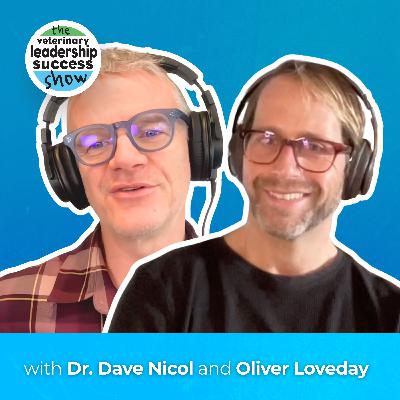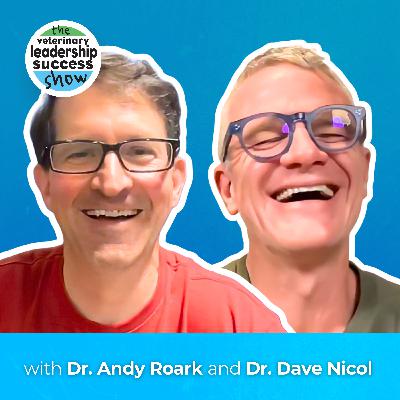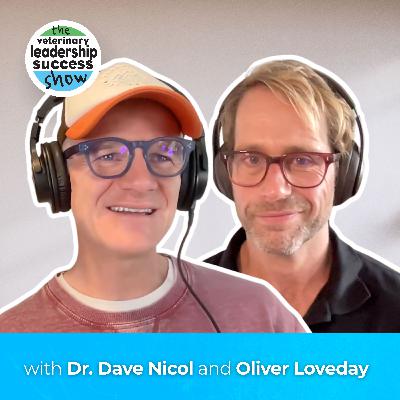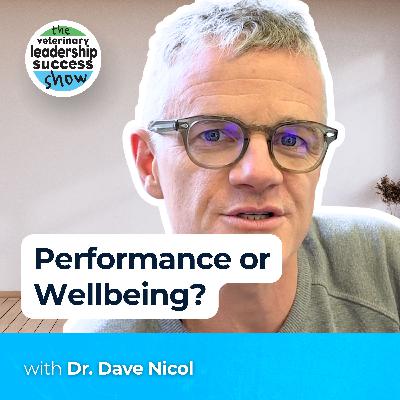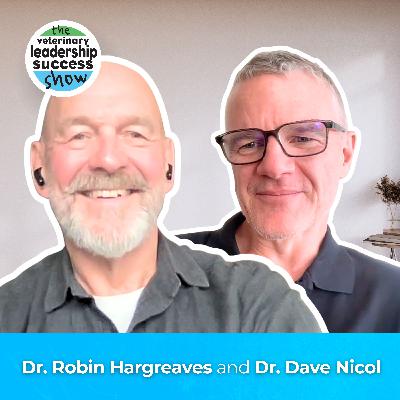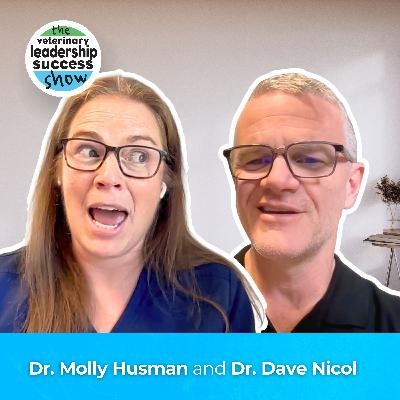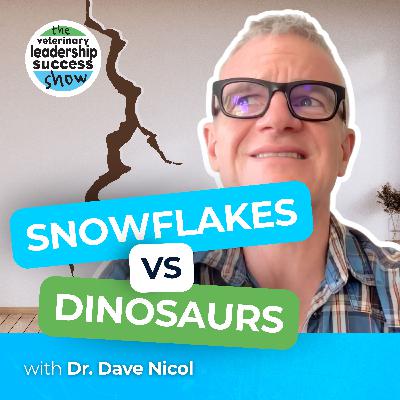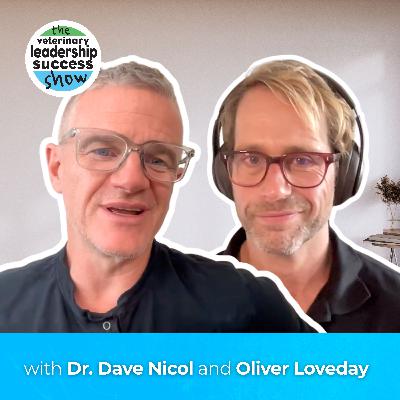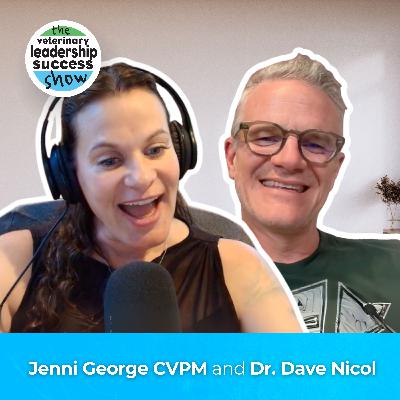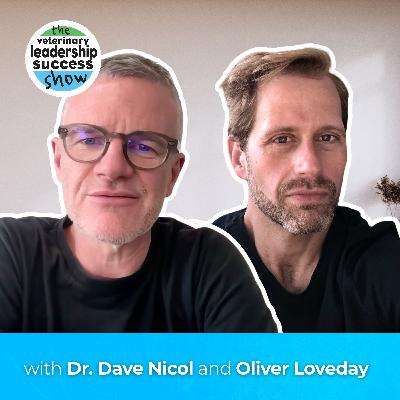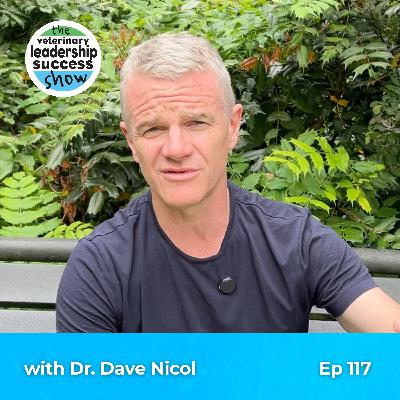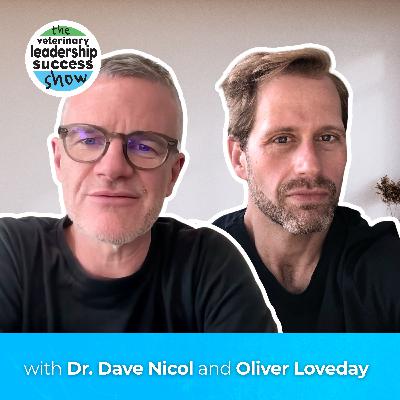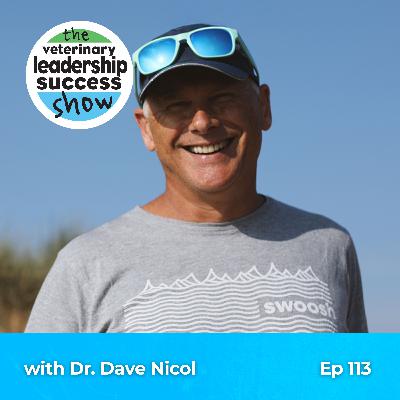Discover The Veterinary Leadership Success Show
The Veterinary Leadership Success Show

The Veterinary Leadership Success Show
Author: By Dr Dave Nicol
Subscribed: 53Played: 1,211Subscribe
Share
© All rights reserved
Description
Short conversations with smart people with good ideas to help you run your veterinary practice more effectively. Each month, your host, Dr. Dave Nicol, puts a subject of importance to practice managers under the microscope with a subject matter expert to help you grapple with real-life management problems.
Loosely arranged around the topics required to complete the CVPM, this show will help you with ideas and inspiration to take on some of the big problems and opportunities we all face in veterinary medicine.
Loosely arranged around the topics required to complete the CVPM, this show will help you with ideas and inspiration to take on some of the big problems and opportunities we all face in veterinary medicine.
129 Episodes
Reverse
Most leaders want change to be quick and clean. A few tweaks. A new policy. A better week.But meaningful change – the kind that transforms culture, steadies the ship, and creates a practice you actually love leading – follows a very different rhythm.In this episode, Oli and I dig into the truth about change. Why overwhelm is a diagnostic, not a character flaw. Why burnout often signals a system problem rather than a personal one. And why rebuilding culture is more like farming than fighting.We explore the emotional, financial and cultural yields your practice should produce, how to diagnose what’s really driving your stress, and why the first brave step is often removing the wrong person, not adding a new one.You will learn practical ways to create immediate relief, the long term strategy for sustainable transformation, and why community support acts as a stabilising wall while you do the real work of leadership.Change is not instant. But there is a path. And when you follow it with intention, the remarkable vet practice you build will give back far more than it takes.Episode Outline:[01:05] – Why change hurts more than it should[03:45] – Burnout isn’t personal, it’s systemic[06:37] – Culture is the soil everything grows in[08:14] – Who should stay on your team – and who shouldn’t[10:28] – Rebuilding from the core, not the surface[12:03] – Why resistance shows up when standards rise[14:49] – Why meaningful change takes a season[16:20] – Finding relief before real change begins[19:28] – Skills can be replaced, attitudes can’t[21:47] – When work becomes an emotional drain[23:04] – Someone has to own the culture[23:46] – Why community stabilises leaders[24:34] – The clearest path forwardResources & Links MentionedNeed clarity on what needs to change? Book a diagnostic call with Oliver at the Veterinary Leadership Academy and let us walk you through your next steps.Download the Leadership Actions Study – practical steps to help you lead with clarity today.https://calendly.com/oliver-vetx/grow-your-vet-practice-1-1-discovery-callExplore our leadership courses – build the skills to create a culture your team loves being part of.Follow Dr Dave Nicol for daily leadership insights and practical tools for running a thriving veterinary practice.Enjoyed this episode?Leave us a review on iTunes and share it with your colleagues in vet med.
This week, we’re doing things a little differently. No written notes. No heavy leadership theory. Just me, Dr. Andy Roark, and a completely ridiculous idea involving visual art - on an audio podcast. (What could possibly go wrong?)If you don’t already know Andy, he’s a practicing veterinarian, international speaker, author, and media personality, and the founder of Uncharted Veterinary Conference, DrAndyRoark.com, and one of the few people in vet med who can make serious topics feel human, and fun.We got into everything from AI scribes saving vets five minutes a consult (and possibly their sanity), to how to stay calm when the world’s losing its head. We even tackled the fine art of giving feedback without crushing someone’s soul.At its heart, this episode’s about perspective. About remembering that veterinary medicine isn’t just science, it’s art. And if we want to stay sane, we’d better learn how to create, not just cope.So grab a brew, settle in, and join us for a conversation about leadership, creativity, and keeping your head while everyone else is losing theirs.Episode Outline:[00:03] – Meet Andy Roark[04:20] – The “F*** yeah” AI moment[06:13] – Staying on time, not speeding up[08:22] – How Andy uses AI in consults[10:21] – Right here, right now[12:03] – Focus on what you can control[12:49] – Feedback as art[15:42] – Why vet med is art[17:27] – Clients, costs, and conflict[20:20] – Who we really work for[23:48] – How perspective shifts[25:52] – What Andy sees differently now[29:47] – Money, motives, and mistrust[30:04] – Don’t be a dick[32:15] – Final thoughtsConnect with Dr. Andy Roark:Website: drandyroark.comLinkedIn: Dr Andy RoarkInstagram: @drandyroarkFollow Dr. Dave Nicol for More Leadership Insights:Follow: @drdavenicolLearn more about veterinary leadership training: Veterinary Leadership AcademyEnjoyed this episode?Leave a review on Apple Podcasts or Spotify and share it with someone who needs a reminder that vet med, for all its chaos, is still an art worth practising.
Most practice owners think they have a vision. A sentence written years ago. A vague idea. A gut feeling. But a real vision, one that energises your team and shapes culture, is something very different.In this episode, Oliver and I break down the most common mistakes owners make when creating their vision – why many end up with fluffy statements that change nothing, why some practices have no vision at all, and why the work isn’t finished once the document is written and alive.We explore how to structure a vision that actually works, how purpose, mission, and values fit together, and the simple tests that tell you whether yours is fit for purpose. You’ll learn why authenticity matters more than polish and how a living, breathing vision becomes rocket fuel for recruitment, retention, culture, and long term sustainability.The medicine gets you started. The vision takes you somewhere worth going. Remarkable practices are built by leaders who choose the path with purpose. Episode Outline:[00:00] – Why vision matters[01:07] – The danger of having no vision[02:14] – Vision as your X factor[06:49] – When structure goes wrong[07:51] – Why “vision, mission, values” fall short[09:46] – The purpose–mission–values model[11:54] – Vision is only useful if you use it[13:19] – The cost of abdication[15:32] – Why vets avoid vision work[18:00] – People, culture and sustainability[20:40] – The goosebumps and butterflies test[22:23] – Writing the unfiltered truth[23:52] – Turning vision into leadership fuelResources & Links MentionedNeed help with your vision? Book a chat with Oliver at the Veterinary Leadership Academy and we’ll help you assess where you are and where you’re going.Download the Leadership Actions Study – practical steps to help you lead with clarity today.Explore our leadership courses – build the skills to create a culture your team loves being part of.Follow Dr Dave Nicol for daily leadership insights and practical tools for running a thriving veterinary practice.Enjoyed this episode?Leave us a review on iTunes and share it with your colleagues in vet med. Great leadership, like great culture, grows when it’s shared.
You care deeply about your practice.The vision, the medicine, the values, the clients - it all matters to you. Maybe a bit too much sometimes.But unfortunately, just because you care, it doesn’t mean your team automatically will.So how do you get them on board? How do you turn that personal passion into something your whole team believes in and wants to be part of?In this episode, Oliver and I dig into what buy-in really looks like inside a practice - how to move from pushing people to inspiring them, why fear and control never create lasting motivation, and how clarity of purpose, mission, and values can turn a team that’s “just doing the job” into one that’s driving the vision forward.You’ll learn how to help your people see what you see, how to build belief through consistency and communication, and how to create the kind of culture where everyone cares - not because they have to, but because they want to.Because when your team believes in the vision, everything else starts to work.Episode Outline:[00:00] – What real care looks like[02:00] – Duty, patients & self care[04:10] – When care goes missing[06:50] – Why “care” isn’t enough[08:20] – The restaurant test[09:35] – Fear kills culture[10:00] – Clarity builds buy-in[11:25] – Purpose, mission, values[12:45] – Defining care for your team[14:00] – Create context, not chaos[14:45] – What truly matters to meResources & Links Mentioned:Download the Leadership Actions Study – simple, practical steps to lead better todayExplore our leadership courses – build the skills to lead your team with confidence and clarityFollow Dr. Dave Nicol for daily veterinary leadership insightsEnjoyed this episode?Leave a review on iTunes and share it with your colleagues in vet med. Because great leadership - like great care - grows when it’s shared.
Why do veterinarians keep burning out?In this episode of the Veterinary Leadership Success Show, I’m unpacking why so many great people in our profession are burning out, and what we can learn from elite athletes about how to fix it.Because in sport, training hard every day is a fast track to injury. Yet in vet med, we do exactly that - long hours, relentless pressure, and no real recovery. Then we wonder why everyone’s limping.I’ll walk you through how to think like a coach - setting the right dose of work, building rest into the plan, and checking in before things start to snap. We’ll talk about how to balance intensity with recovery and why emotional fuel is every bit as important as physical energy.Episode Outline:00:00 – Performance or wellbeing? (You can have both.)01:00 – Lessons from the track: what sport can teach vet med03:00 – Running slow to go fast06:00 – The four factors of performance: volume, intensity, rest, and fuel10:00 – When teams “train” too hard and start to break13:00 – Building resilience, not fatigue16:00 – Check in before they burn out18:00 – Fuel, rest, and emotional recovery20:00 – Your leadership training plan for a healthier teamWant more leadership tools in your corner?Follow me: @drdavenicolCheck out: Veterinary Leadership AcademyRun your eNPS: drdavenicol.com/get-your-enpsIf this episode hit home, leave a review or share it with a teammate.
This week, we’re asking the big question - what happened to mentorship in vet med?To help me figure it out, I’m joined by Dr. Robin Hargreaves - former BVA President, lifelong mixed practitioner, and a man who’s spent nearly 40 years mentoring vets, leading teams, and keeping his sense of humour intact (which, frankly, might be his greatest achievement).Robin grew up on a hill farm in the Yorkshire Dales, built and ran a four-site, 50-person independent practice, and has seen the profession evolve from handwritten records to AI tools that still can’t spell “lab retriever.” He’s known for his straight talk, northern grit, and deep care for the people coming up behind him.In this episode, we dig into how mentorship quietly disappeared, why it matters more than ever, and how we can bring it back - stronger, wiser, and a lot less formal than you’d think.So grab a brew, tune in, and let’s talk about how to keep wisdom alive in vet med.Episode Outline[00:03] – Meet Robin Hargreaves[04:14] – One broken arm, one life-long career[07:51] – Why tough years become good stories[09:55] – Where is mentorship in vet med?[12:05] – Why we MUST share wisdom[15:25] – A new kind of mentorship for today[17:30] – Three lessons every leader needs[18:23] – Stop defending. Start listening.[21:10] – When to stop leading [23:01] – Being smart isn’t everything[25:11] – How consistency builds trustConnect with Robin Hargreaves:LinkedIn: Robin Hargreaves, BVSc MRCVSInstagram (bird photography & life wisdom): @robinhargreavesFollow Dr. Dave Nicol for More Leadership Insights:Follow: @drdavenicolLearn more about Veterinary Leadership Training: Veterinary Leadership AcademyEnjoyed this episode?Leave a review on iTunes and share it with your colleagues in vet med.
What do you do when most of your team walks out? Pour a stiff drink? Hide under the desk? In this week’s Veterinary Leadership Success Show, I’m joined by Dr. Molly Husman, owner of Brinker Veterinary Hospital up in Lake Orion, Michigan, and a woman who has lived through the leadership nightmare most of us secretly dread.Within a year of buying her clinic, she made the brave decision to let someone go. It didn’t go down well. In fact, it set off a chain reaction that left her with just a handful of staff and a whole lot of self-doubt.But here’s where the story gets good. Molly didn’t crumble - she rebuilt. Brick by brick, hire by hire, dad joke by dad joke (you’ll see what I mean). She rediscovered her purpose, learned to trust again, and built a team that actually wants to be there. Today, she’s running a low-volume, high-touch, heart-led practice that’s about to move into a new purpose-built home.We talk about the fear of letting go, the power of trust, and why sometimes the most painful decisions turn out to be the best thing that could’ve happened to you.Grab your headphones, pour something strong, and settle in - this one’s a masterclass in courage, clarity, and leadership with heart.Episode Outline[00:03] – When your whole team walks out[03:20] – Buying a clinic with someone else’s culture[05:16] – The firing that changed everything[06:07] – “Stay in joy or go in peace”[08:20] – Rebuilding from scratch[09:42] – Turning fear into freedom[13:11] – What trust really looks like in a vet clinic[14:24] – Looking at your clinic differently[16:39] – Learning to step back and actually lead[18:34] – Realizing you might be the problem[20:25] – Hiring slow, building fast[22:12] – One interview question that changed everything[23:51] – Trust as the heartbeat of culture[25:18] – Building a practice that fits youConnect with Dr. Molly HusmanBrinker Veterinary HospitalConnect with Dr. Molly on LinkedinFollow Dr. Dave Nicol for More Leadership InsightsFollow: @drdavenicolLearn more about Veterinary Leadership Training: Veterinary Leadership AcademyEnjoyed this episode?Leave a review on iTunes and share it with your colleagues in vet med.
Generational battles are raging in vet med. Older vets roll their eyes at “snowflakes” and their boundaries. Younger vets look at the “dinosaurs” and wonder why on earth burnout is worn like a badge of honour. So who’s right?In this episode, I dig into why these clashes happen, what both sides are actually getting right, and why the finger-pointing is making things worse, not better. We’ll talk about the lost art of mentorship, the corporate wrecking ball that’s left generations stranded, and the leadership skills that can turn all this conflict into collaboration.Snowflakes. Dinosaurs. The labels make it easy to judge, but they don’t solve the real problem: our teams are breaking under the weight of division. In this episode, I’ll show you how to stop fighting the wrong battle - and start leading in a way that brings generations together.Episode Outline: [00:01] – Snowflakes vs Dinosaurs [02:00] – Why the pendulum has swung [04:07] – Burnout as “rite of passage” [05:31] – What younger vets really want [06:58] – The corporate salary trap [08:23] – The Workload Goldilocks Zone [09:39] – The mentorship gap [11:22] – Fragile? Or just learning? [12:28] – Mentorship done right [13:20] – Why leadership is missing [14:10] – Curiosity vs judgment [15:08] – A message to the older generation [15:35] – A message to the younger generation [16:30] – Pets don’t care about labelsResources & Links Mentioned:Download the Leadership Actions Study – simple, practical steps to lead better todayExplore our leadership courses – build the skills to lead your team through complexityFollow Dr. Dave Nicol for daily leadership insightsEnjoyed this episode? Leave a review on iTunes and share it with your colleagues in vet med!
Hiring is one of the hardest jobs in veterinary leadership right now. Everyone’s fishing in the same tiny pond, and most practices look and sound exactly the same. In this episode, I break down why veterinary recruitment feels like such a nightmare, and more importantly, what you can do to fix it. Spoiler alert: it’s not just about throwing more money at the problem.We’ll dig into what employer branding really means, how to stop writing job ads full of buzzword bingo, and why a clear vision, purpose and set of lived values will do more for your hiring than any signing bonus. I’ll also give you a simple equation to score your employer brand, so you can see exactly where you’re strong, and where you’ve got work to do.If you’re blaming “the market” for your hiring woes, this one’s going to challenge you. Because the truth is, there are practices out there with people lining up to join them. The difference? They’ve learned how to tell their story. And you can too.Your story could be the key to better hires. Join our upcoming webinar and find out how, save your seat now.Episode Outline:[00:01] – Why hiring’s tough[03:00] – Standing out[07:01] – Employer brand 101[10:17] – Vision vs buzzwords[11:05] – Purpose, mission, values[16:21] – The brand equation[19:46] – Telling your story[22:26] – Employee experience first[25:08] – Don’t blame the market[27:33] – Be unapologetically you[29:11] – Webinar preview[30:01] – Free NPS surveyResources & Links Mentioned:Register for our Employer Branding WebinarJoin our free Net Promoter Score (NPS) survey studyDownload our leadership brochuresFollow Dr. Dave Nicol for More Leadership Insights:Follow Dr. Dave: @drdavenicolLearn more about the Veterinary Leadership AcademyEnjoyed this episode?Leave a review on iTunes and share it with your veterinary colleagues!
In this episode of the Veterinary Leadership Success Show, I’m joined by the brilliant Jenni George, CVPM. Jenni is a practice manager, co-owner of Deerfield Veterinary Clinic, and living proof that building a practice is never boring.Her story? Well, let’s just say it starts with a fold-up table in the living room, a flannel blanket for style, and a husband with big dreams but questionable bill-paying skills. Fast-forward to today and she’s running a 25+ person, multi-doctor hospital. Along the way there have been triumphs, chaos, a few questionable jello shots… and oh yes, an old “friend” who ended up in jail after botching their clinic build. You just couldn’t make it up.Together we dig into the truth about practice growth: what works when you’re starting out, why it all falls apart when you get bigger, and how to keep evolving as a leader so your clinic doesn’t implode under its own weight. Jenni is funny, sharp, brutally honest, and not afraid to tell you exactly what she got wrong, and what she’d do differently.If you’ve ever thought “Help! My clinic is growing too fast!” or felt like your team has outgrown your leadership, this one’s for you. Buckle up, this one’s packed with chaos, comedy, and the kind of lessons you only learn the hard way.Episode Outline:[00:03] – Tequila & bad ideas[05:42] – From living room to hospital[07:46] – 3 big start-up mistakes[11:00] – Friends vs leadership[13:23] – Stages of growth[17:01] – Hiring the first vet[23:22] – Standing out locally[29:01] – Outgrowing your space[33:22] – Power of a manager[35:58] – Beating imposter syndrome[38:31] – Here for the people[40:42] – Culture cracks[44:45] – Building leaders[49:13] – Vision = next levelConnect with Jenni George:Learn more about Deerfield Veterinary ClinicDeerfield Vet Clinic on Facebook Follow Dr. Dave Nicol for More Leadership Insights:Follow Dave: @drdavenicolLearn more about Veterinary Leadership Training: Veterinary Leadership AcademyEnjoyed this episode?Leave a review on iTunes and share it with your veterinary colleagues!
In this episode of the Veterinary Leadership Success Show, I’m joined by my copilot, Oliver Loveday, Head of Community here at the Veterinary Leadership Academy. We’re digging into one of the most overlooked but absolutely critical parts of running a successful veterinary practice: your vision.And I don’t mean some fluffy slogan you stick on a wall and then ignore. I’m talking about the hard graft of clarifying your purpose, your mission, and your values, the foundation stone that makes everything else work and align. Without it, you’re building on sand. With it, you’ve got a north star to guide the biggest decisions you’ll ever make: who you hire, how you shape your culture, the way you connect with clients, and even how you hold yourself together on your toughest, most difficult days.The painful truth? Most practice owners either don’t do this work, or they do it badly. And when that happens, it’s only a matter of time until the cracks show. Poor hiring decisions, a toxic culture, poor team alignment, wasted energy, and a practice that feels harder to lead than it should.Oliver and I share stories from inside our community of practice owners who’ve gone through what we call “vision casting.” These are raw, vulnerable, sometimes emotional sessions that strip back the layers and get to the truth of why their practice exists. And when that clarity hits, you feel it. A good vision gives you goosebumps and butterflies. It attracts the right people, keeps your team moving together and motivated, and fuels you as a leader when the simplest tasks feel impossible.If you’re wondering where to start with your vision, this is the episode for you. Tune in, hear how we do it, and if you’re serious about taking the next step, reach out to Oliver Loveday to find out how we can help.Episode Outline:[01:00] – The Owner’s 3 Core Jobs[03:30] – What Vision Really Means[05:00] – Switching Brains: Logic to Creative[07:00] – Why Vision Matters in Hiring[10:30] – The Goosebump Test[12:00] – Vulnerability & Masks[16:00] – Real-World Examples[27:00] – Humility in Leadership[29:00] – Our Practice Vision[30:30] – What You Need To Do NextConnect with Oliver Loveday:Book A Call with OilverConnect with Oliver on LinkedinFollow Dr. Dave Nicol for More Leadership Insights:Follow Dr. Dave: @drdavenicolLearn more about the Veterinary Leadership AcademyEnjoyed this episode?Leave a review on iTunes and share it with your veterinary colleagues!
In this solo episode of the Veterinary Leadership Success Show, I’m diving into a topic that’s been bothering me for a while: trust.Now, on paper, the public still ranks vets among the most trusted professionals out there – second only to nurses in most surveys. But out in the real world, I keep seeing behaviours that chip away at that trust. Slowly. Quietly. Consistently. And if we’re not careful, the credibility we’ve spent decades building as a profession is going to unravel.From sloppy admin at the front desk to thoughtless social media posts that poke fun at clients, we’re creating cracks in the very foundation of our relationships. I’ll share a personal experience that brought this home to me in a big way, and we’ll look at why training, communication and emotional intelligence aren’t soft skills – they’re survival skills.If you’re a veterinary leader who wants to build a practice your clients trust and your team is proud to stand behind, this episode is for you. Because trust isn’t built by accident, it’s built on purpose, or not at all.Episode Outline:00:00 – The client-bashing problem01:25 – Why trust matters03:00 – How relationships break05:00 – The skill behind good interactions07:15 – Are we really empathetic?09:00 – When trust breaks: my story12:00 – Systems vs people13:45 – What leaders must fix15:30 – Take actionWant more leadership tools in your corner?Follow me: @drdavenicolCheck out: Veterinary Leadership AcademyRun your eNPS: drdavenicol.com/get-your-enpsIf this episode hit home, leave a review or share it with a teammate.
In this episode of the Veterinary Leadership Success Show, I’m addressing yet another wave of bad press, this time from none other than the BBC, whose front-page headline accused rising vet fees of driving more pets to be euthanised.The article tries to point the finger at corporate practices, but let’s be honest, most readers won’t see that nuance. To the public, it’s not “corporates”, it’s “vets.” All of us. Once again, our profession is being dragged through the mud to serve someone else’s agenda.So I’m taking this one personally, and professionally. In this episode, I call out the lazy data, the unverified claims, the internal sabotage from within our own ranks, and the real damage this kind of media narrative causes to public trust and veterinary morale.Corporate practices aren’t going away. And sniping from the sidelines with half-truths and clickbait headlines won’t solve anything. So, what will? Leadership. Engagement. Advocacy. Starting with you.If you’re a vet who cares about the long-term trust, sustainability, and credibility of our profession, this episode is for you.Episode Outline:[00:00] – Another Week, Another Hit Job[01:00] – Corporate Vets as the Easy Target[03:00] – The Public Doesn’t See the Difference[04:15] – “We’ve Lost Trust”? Nonsense[05:30] – What the Data Really Says[06:15] – Economic Euthanasia: Any Proof?[07:10] – What’s Actually Driving Costs[08:00] – Value, Communication, and Leadership[08:50] – Whining Isn’t Leadership[09:30] – Perception Becomes RealityEpisode Links:BBC Article: More pets being put down due to rising vet bills, BBC toldFollow Dr. Dave Nicol for More Leadership Insights:Follow Dave: @drdavenicolExplore Veterinary Leadership Training: Veterinary Leadership AcademyEnjoyed this episode?Leave a review on iTunes and share it with your veterinary friends. Your voice helps others discover the show and join the leadership movement.
In this episode of the Veterinary Leadership Success Show, we’re pulling back the curtain on something that’s quietly sabotaging teams across the veterinary profession: disengagement.I’m joined by Oliver Loveday, our Head of Community, to talk about the early findings from our Veterinary Employee Engagement Benchmark Study (VEEBS). We’ve had over 80 practices take part already, and the results are both sobering and full of opportunity.What we’re seeing is a consistent, avoidable gap – a breakdown in day-to-day communication, appreciation, and leadership follow-through. And it’s happening in practices where the leaders genuinely care, but are overwhelmed, overstretched, or just don’t have the systems in place to stay connected.This episode is a wake-up call and a guide. We unpack the biggest blind spots that are showing up in the data, from feeling ‘too nice to lead’ to ‘trust that’s really avoidance’ and we offer practical advice to help you reconnect with your team before the wheels fall off.If you’ve ever thought “but I’m trying to lead well, so why isn’t it working?”…this episode’s for you.Episode Outline:00:00 – Why we created VEEBS and what it measures02:15 – The courage to ask hard questions04:40 – Net Promoter Score vs real engagement08:10 – What we’re learning from 80+ practices12:00 – The feedback famine: no system, no support15:00 – Growing pains: why teams break at 12–15 people18:30 – Too kind to lead? Why empathy needs boundaries21:00 – Lack of appreciation = lack of love24:00 – How to join the VEEBS study (for free!)Want more leadership tools in your corner?Follow me: @drdavenicolCheck out: Veterinary Leadership AcademyWant to take part in VEEBS? Sign up here: drdavenicol.com/get-your-enps If this episode helped you see something in a new light, leave a review on iTunes or send it to a fellow leader who might need to hear it. That’s how we build stronger teams, one small step at a time.
In this episode of the Veterinary Leadership Success Show, I’m tackling a topic that’s going to shape the future of our profession, whether we’re ready or not, I’m talking about AI.Now, I know what you’re thinking. Another shiny tool, another thing to learn. But this one’s different. Used right, AI can help you cut through the chaos, free up your time, and finally start making real progress on the stuff that actually matters, like culture, strategy, and leadership.From SOPs to job ads, marketing content to performance reviews, AI can help you get more done, faster. This episode is your straight-up guide to what’s possible, what’s working, and why leaders who ignore it are going to get left behind.If you’re ready to get out of reactive mode and take back control, this one’s for you.If you want to learn more about how AI can help you and your practice, watch my free webinar now.Episode Outline:00:00 – The divide: AI adopters vs the left-behind02:30 – Life inside a practice manager’s brain04:00 – The stress of decision-making05:00 – How AI helps with hiring, HR, marketing07:00 – It’s a toolkit, not the Terminator10:45 – Ten ways AI saves you hours every week13:00 – Real-world wins: coaching, content, strategy16:35 – Webinar details and final thoughtsEpisode LinksIf you want to learn more about how AI can help you and your practice, watch my free webinar now.Want more leadership tools in your corner? Follow me: @drdavenicolCheck out: Veterinary Leadership AcademyIf this episode hit home, leave a review on iTunes and share it with someone you think could do with some help. That’s how we get better leadership into more practices, where it’s desperately needed.
In this episode of the Veterinary Leadership Success Show, I’m circling back to a blog post that clearly hit a nerve—“Is Veterinary Mentorship the Greatest Casualty of Corporatization?”. The response was huge. You shared stories, frustrations, and a whole lot of heart. So today, I’m unpacking those comments, reflecting on what they really mean for our profession and exploring what we can do, practically, to turn the tide. If you care about the future of veterinary leadership (and I think you do), this one’s worth your time.From the silent regret of practice sellers, to the operational time crunch faced by independents, to the shortsightedness of corporate leadership in sidelining seasoned vets, this episode is both a call to action and a glimmer of hope. Because while the system may be creaking, the appetite for change is real, and you might just be part of the solution.Episode Outline:[00:00] – A Bold Question: What Happened to Mentorship?[03:15] – What We’re Losing Without Mentors[05:20] – The Gap Between Knowing and Doing[08:00] – Selling Up: Reflections from Former Practice Owners[10:30] – Corporatization: A Leadership Vacuum and Lost Wisdom[12:45] – Independents Aren’t Immune: Time Poverty and Clinical Addiction[15:00] – Declining Clinical Skills and Public Trust[19:30] – Are Startups the Answer? A Nuanced Look at Hope and Hype[22:15] – Your Role in the Solution: Start Now or Wait 6 YearsEpisode LinksIs Veterinary Mentorship the Greatest Casualty of Corporatization? BlogFollow Dr. Dave Nicol for More Leadership Insights:Follow Dave: @drdavenicolExplore Veterinary Leadership Training: Veterinary Leadership AcademyEnjoyed this episode?Leave a review on iTunes and share it with your veterinary friends. Your voice helps others discover the show and join the leadership movement.
In this episode of the Veterinary Leadership Success Show, I’m joined by Mike Porteous – a Level 3 Triathlon Coach, British Triathlon mentor, and the founder of Zig Zag Alive. Mike’s coaching journey spans over two decades, guiding athletes from wobbly first-timers to seasoned competitors with his unique approach to coaching and self-belief.But Mike’s expertise doesn’t stop at sports. He’s also a Swim England instructor teaching children with disabilities through the charity Level Water, and he’s written for the Outdoor Swimming Society, sharing his insights on preparing for big swims and other endurance challenges. Before diving into the world of Lycra and Ironman races, Mike was a social scientist with a PhD, an MBA, and a civil service career – a background that has deeply influenced his coaching philosophy.We explore the core principles of his method, 'Confidence-Centered Coaching,' and unpack how his diverse career journey informs his work with athletes today. From breaking the hamster wheel of habitual overwork to building sustainable, self-belief-driven progress, Mike shares powerful insights on how leaders in any field – including veterinary practice – can learn to coach with empathy, create space for growth, and drive genuine progress without burnout.If you’ve ever felt stuck in a cycle of constant hustle with little reflection, or if you want to learn how to inspire lasting change in your team, this episode is a must-listen. It was a huge pleasure to bring someone who coaches me into the limelight. I hope this shines some light on a keystone subject for all leaders.Episode Outline:[00:00] – Meet Mike Porteous: Coach & Founder of Zig Zag Alive.[03:15] – From Civil Service to Triathlon.[05:30] – What Is Confidence-Centered Coaching?[08:45] – Coaching vs. Telling (aka consulting).[12:00] – Creating Space for Growth.[15:20] – The Hamster Wheel of Leadership.[19:00] – Coaching in Action.[22:30] – Confidence Through Ownership.[26:45] – Swim Coaching for Children with Disabilities.[29:30] – Beyond Belief: Mike’s Book.[33:00] – How Leaders Can Coach.[36:45] – Sustainable Success.[40:30] – Looking Forward.[44:00] – Wrapping Up.Episode Resources:Mike’s Book: Beyond Belief: The Art of Confidence-Centered Coaching by Mike PorteousConnect with Mike Porteous on LinkedinZig Zag Alive’s WebsiteBrene BrownThe Human Behind the Coach, Claire PatrickFollow Dr. Dave Nicol for More Leadership Insights:Follow Dave: @drdavenicolLearn more about Veterinary Leadership Training: Veterinary Leadership AcademyEnjoyed this episode?Leave a review on iTunes and share it with your veterinary colleagues!
In this reflective episode of the Veterinary Leadership Success Show, I’m diving into one of the most important, yet often overlooked questions we face as veterinary leaders: Are we spending our precious time wisely?Sparked by a personal experience attending the funeral of a dear friend, I explore three deep reflections that emerged—how business can be a force for good, why who you spend your time with matters more than you think, and the sobering reminder that none of us are guaranteed endless tomorrows.If you’ve ever found yourself delaying important decisions, holding off on essential conversations, or postponing dreams for "someday," this episode offers a timely nudge to re-evaluate what really matters—and to take action now.Episode Outline: [00:00] – Reflections from a Life Well Lived[02:15] – Business as a Force for Good: Why It Matters[04:40] – Escaping the Zero-Sum Game Mindset in Veterinary Practice[05:55] – Why the People You Work With Matter More Than You Think[07:10] – Building Teams That Energize, Not Drain[08:00] – Do You Really Have Time? Facing Life’s Big Question[09:00] – The Urgent Call to Act on What Truly MattersFollow Dr. Dave Nicol for More Leadership Insights:Follow Dave: @drdavenicolLearn more about Veterinary Leadership Training: Veterinary Leadership AcademyEnjoyed this episode?Leave a review on iTunes and share it with your veterinary colleagues!
In this episode of the Veterinary Leadership Success Show, I’m joined by Dr. Mark Reeve, second-generation practice owner of Tea Tree Gully Veterinary Hospital in South Australia. Mark’s approach to team development is anything but traditional—and it’s paying off in spades.What started as a frustration with stagnant nursing careers and dusty procedure manuals became a mission to revolutionize learning in his clinic. Inspired by the leadership playbook Turn the Ship Around by David Marquet, Mark and his team have built a powerful in-house certification program that’s giving his nurses real direction, satisfaction, and career momentum.From ditching the 200-page ops manual to introducing 60+ micro-certifications tied directly to pay and performance, Mark shares exactly how his practice transformed learning into a dynamic, gamified system that’s increasing retention, boosting skill levels, and creating a culture of repeatable excellence.If you want your team to love learning, feel empowered, and stick around for the long haul—this episode is a must-listen.Episode Outline: [00:00] – Skills as Procedures[01:00] – Meet Dr. Mark Reeve: Second-gen vet and practice owner in Adelaide[03:20] – From James Herriot Roots to Modern Leadership[04:30] – The Problem: No CPD, no progression, high nurse attrition[05:50] – Enter Turn the Ship Around: A Navy-inspired pivot to career pathways[07:10] – Turning a Dusty Procedure Manual into 60+ Micro-Certificates[08:45] – Monthly Recognition, Mentorship, and Real Accountability[10:00] – Retention, Repeatability, and Pay Tied to Progress[11:45] – A Fairer, More Transparent Career Path (No More Tenure Bias)[14:00] – Going Beyond Basic Roles: Consulting, Clinics, Anesthesia & More[17:00] – The Impact on Training ROI & Vet Skill Uptake[20:00] – Curriculum Creation on the Fly—And Why Alpha Testing Works[25:30] – Certificates Built by Nurses, for Nurses[27:00] – Why Mark Doesn’t Worry About Recruitment Anymore[29:15] – Soft Skills, Client Care & Team Ownership[31:00] – Scaling Learning with ChatGPT & Automation (Future Vision)[34:30] – The Power of Procedural Thinking[36:30] – From Lip Service to Long-Term Success Plans[38:15] – “Everyone Comes Home”: How Mark Built an Alumni Culture[39:45] – Building a Pipeline from High School to Hospital LeadershipResources:Book Mentioned: Turn the Ship Around by David MarquetConnect with Dr. Mark Reeve:Tea Tree Gulley Veterinary Hospital: https://www.ttgvet.com.auDr. Mark Reeve on Linkedin: https://www.linkedin.com/in/mark-reeve-a3419068/ Follow Dr. Dave Nicol for More Leadership Insights:Follow Dave: @drdavenicolLearn more about Veterinary Leadership Training: Veterinary Leadership AcademyEnjoyed this episode?Leave a review on iTunes and share it with your veterinary colleagues!
In this episode of the Veterinary Leadership Success Show, I’m diving into one of the most common frustrations veterinary professionals face—difficult client interactions—and flipping the script.What if the problem isn’t just the clients? What if the way we communicate, the assumptions we make, and the systems we put in place are actually feeding the fire?Drawing from a recent conversation at a veterinary congress, I explore the hidden costs of poor communication, the myths we tell ourselves about client behavior, and the powerful evidence that shows just how appreciated we really are by the public. If you’ve ever felt demoralized by one too many rude comments, this episode will reset your perspective and give you tools to build better client relationships.Whether you’re a seasoned vet or new to practice, this episode will remind you why the way you connect with clients matters and what to do when it goes wrong.Episode Outline: [00:00] – "You’re Only in It for the Money"[02:15] – Are Vets Really Overpaid? The Truth Behind the Money Myth[04:40] – Clients Trust You More Than You Think (Here’s the Data)[07:10] – What Breaks Trust: Small Failures, Big Consequences[09:00] – They Won’t Say Yes if They Don’t Trust You[10:45] – Soft Skills Are Core Skills—Build Them Into Your PracticeFollow Dr. Dave Nicol for More Leadership Insights:Follow Dave: @drdavenicolLearn more about Veterinary Leadership Training: Veterinary Leadership AcademyEnjoyed this episode?Leave a review on iTunes and share it with your veterinary colleagues!


